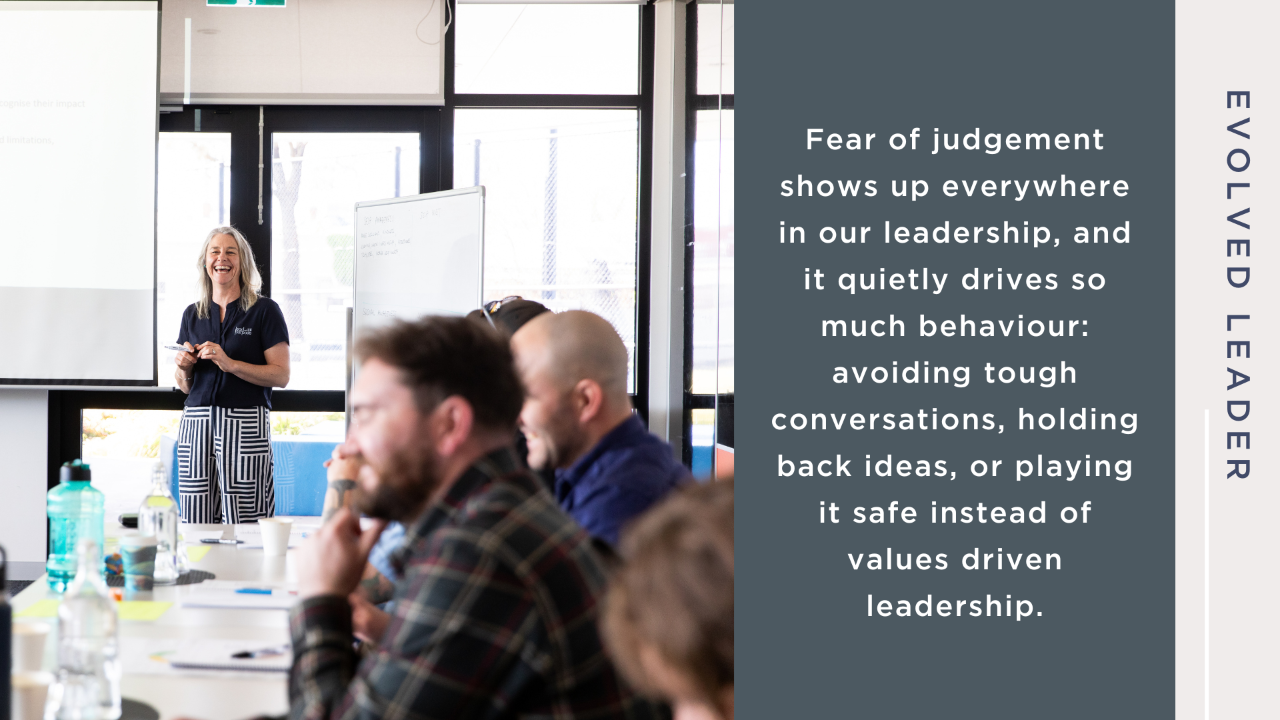Get Real: Where Is Fear of Judgement Holding You Back?
Oct 10, 2025
We don’t often talk about it out loud, but fear of judgement shapes more leadership behaviour than we realise. It’s the subconscious belief that says: “Make sure you look like you’re on top of your game.” Or “Don’t admit you’re unsure, you need to look like you know your stuff.” On the surface, it looks like confidence and control.
Underneath, it’s often driven by trying to navigate your environment to make it more favourable or portraying a certain leadership persona that you think will be valued.
Fear of judgement doesn’t always stop us from acting, but it will change how we act. You might soften the truth in feedback, hold back a bold idea, or make a decision that pleases the room rather than reflects what you know is right. In the short term, it feels safer. But over time, it dilutes your leadership, not to mention the mental fatigue fear of judgement creates.
Constantly scanning for approval or managing how you’re perceived creates a heavy mental load. It drains energy that could be spent on clarity, creativity or courage. Leaders I work with often describe this as exhausting; the second-guessing, the rehearsing of words or what information to share, the replaying of conversations afterwards. The more time you spend editing yourself for others, the less capacity you have for the real work of leadership.
The other side of this is your team. The people around you know when you’re playing it small. They sense when you’re prioritising approval over principle. And whether you intend to or not, you send a message: “looking good in certain rooms or to certain people matters more than doing what’s right.”
Why it feels so strong
Fear of judgement comes from our wiring. Research shows our brain interprets judgement and rejection as a genuine threat, lighting up the same pain centres as physical danger. When that happens, our system pushes us towards safety which can look like: staying quiet, don’t take the risk, blend in. The problem is that leadership asks us to do the opposite.
Start by noticing, not fixing
Before you jump to “how do I change it?”, pause. The first step is to get real with yourself:
- Where do I choose approval over honesty?
- Which situations trigger my fear of being judged?
- What’s the cost, to me, my team, or my decisions, when I prioritise fear over values?
Sit with the answers, even if they’re uncomfortable. Awareness creates choice. Once you can see your patterns, you can identify the moments where fear is leading you, over your values.
A different starting point
Courage isn’t the absence of fear of judgement, it’s acting in alignment with who you are, even when fear is present. Clarity must come first. When we know what we stand for as a leader we have a reference point stronger than other people’s opinions. We may still feel the fear of judgement, but it doesn’t get the final say.
So, here’s the challenge for you:
Where in your leadership are you holding back or making a different choice because of fear of judgement?
What would it look like to act from your values instead?
Noticing is the first step. The tools and practices will come later. For now, the invitation is simple: get real with yourself.
Honestly answer these questions, write down your answers.
Where does fear of judgement show up most strongly for me as a leader? (Think of situations, people, or decisions.)
How does it change my behaviour? (Do I play it safe, stay quiet, or go with a different more favourable option? Is this done to present a more “I’m all over it” version of myself? Or something else?)
What would I do differently in those moments if fear of judgement wasn’t in the driver’s seat?
Get Evolved Leader delivered to your inbox every week to receive effective tools and practical ideas you can implement to develop your own leadership skills and style as well as those in your team.
We hate SPAM. We will never sell your information, for any reason.


